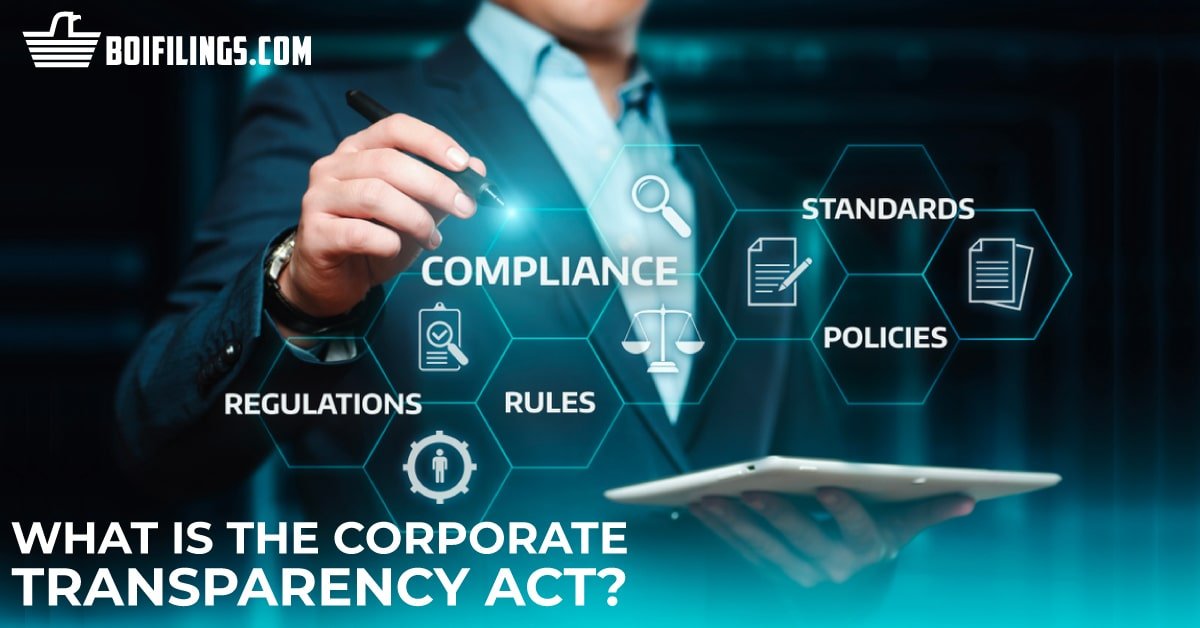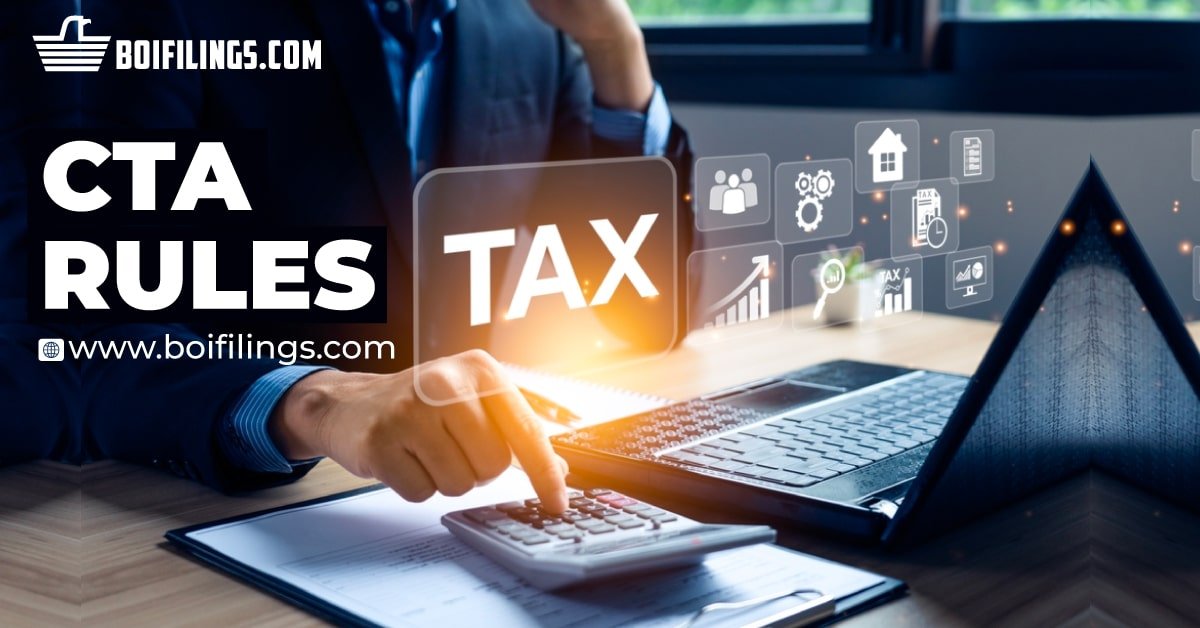What is the CTA (Corporate Transparency Act)?
In the ever-changing landscape of the business world, new regulations and acts emerge, each bearing a unique impact on businesses. Know about Beneficial Ownership Information. One of the recent additions to this regulatory environment is the Corporate Transparency Act (CTA). But what is it, and why should business professionals be attuned to its significance?
What is the CTA (Corporate Transparency Act)?
In the ever-changing landscape of the business world, new regulations and acts emerge, each bearing a unique impact on businesses. Know about Beneficial Ownership Information. One of the recent additions to this regulatory environment is the Corporate Transparency Act (CTA). But what is it, and why should business professionals be attuned to its significance?
This does not mean that every mom-and-pop shop on the street needs to report their Beneficial Owner. Instead, the CTA focuses on specific entities like Limited Liability Companies (LLCs) and corporations formed under the law of any state or Indian Tribe within the United States or foreign entities registered to do business in the U.S.
How the CTA Differs From Previous Regulations
Previously, the United States didn't have a centralized, comprehensive system requiring companies to disclose beneficial ownership information. What is the Financial Action Task Force? This posed challenges for law enforcement agencies trying to trace the origins of illicit funds or investigate entities involved in shady dealings. Do you know the Beneficial Ownership Secure System? The CTA plugs this gap, mandating that such details are not just collected but also updated annually, ensuring that the data remains current and relevant.
The New BOI Law
The recent Transparency in Corporate Practices Act initiated a major policy shift. Entities, such as most LLCs and corporations, are now required to report beneficial ownership information to FinCEN, which is the Financial Crimes Enforcement Network. Want to know about the Financial Action Task Force? This policy will go into effect on January 1, 2024.
These companies must file initial Beneficial Ownership Information reports within thirty days of the date on which they are formed or registered to do business. Want to know Beneficial Ownership Report? Previously formed companies must also file updates to their BOI reports within thirty days of any changes to the information that was previously reported.
Our organization is standing by to take care of this crucial BOI filing on behalf of your business so you can avoid harsh penalties, including a potential $500 per day fine Corporate Transparency ACT You can order your BOI filing via our homepage. Or, feel free to give our organization a phone call. We are standing by to help you understand and adhere to this new law so your business can stay protected.
Small Businesses and the CTA: What's the Deal?
Many business professionals, particularly those operating small businesses, may be pondering over how the CTA impacts them. Let's get into the nitty-gritty. Know here about the Beneficial Definition.
The good news is that the CTA provides exemptions for larger, well-regulated companies that are less likely to be used as shields for illicit activity. This includes entities that:
- Have over 20 full-time employees in the U.S.
- Submitted federal income tax documents reflecting gross receipts or sales exceeding $5 million.
- Maintain a physical presence within the United States.
This essentially means a considerable number of smaller businesses may fall under the ambit of the CTA. However, this isn't necessarily a bad thing. Here's why:
- Transparency is the Future
As the world moves towards a more transparent business environment, regulations such as the CTA are setting the standard. For small businesses, this can be an advantage. Know more about the CTA Corporate Transparency ACT. By adhering to these standards, small businesses can send a strong message to partners, investors, and customers about their commitment to transparency and fair business practices. Want to know What are Beneficial Owners? In the long run, this could enhance their reputation and boost trust.
It's undeniable that the CTA brings about new responsibilities. Want to know What are Beneficial Owners? Reporting and updating beneficial ownership information can be an administrative task, especially for businesses that have not maintained such records before. FATF - Financial Action Task Force However, this also presents an opportunity for businesses to streamline their internal processes and ensure they have a clear understanding of their ownership structure.
The Silver Lining for Small Businesses
While the CTA brings forth new reporting requirements, it's important to note that it also alleviates the risk of getting entangled with entities involved in illicit activities. Know about Personally identifiable information? Knowing the beneficial owners of companies you're dealing with can serve as an added layer of due diligence, ensuring that your business stays clear of potentially harmful partnerships.
Looking Ahead: The CTA and the Future Business Landscape
The CTA isn't just another regulation for businesses to grapple with. It's a reflection of the evolving global business environment, one that values transparency, accountability, and trust. Visit here & learn more about Customer Due Diligence for Business Owners. For businesses, both big and small, adapting to such regulations is not just about compliance; it's about embracing the future of business.
As we move forward, small businesses will find that such acts of transparency become integral to their growth and reputation management. Know here about the Small Business Association. Embracing the CTA and understanding its nuances today will place businesses in a stronger position tomorrow, allowing them to navigate the future with confidence.
The Broader Implications of the CTA
One might wonder, beyond the direct obligations and benefits to businesses, what are the larger ramifications of the CTA on the U.S. business environment?
- Strengthened International Relations and Trade
As the U.S. adopts more stringent transparency measures, it aligns more closely with international standards. Many countries around the globe are pushing for increased corporate transparency. Visit & know about Anti Money Laundering. By being at the forefront of this movement, the U.S. not only ensures a competitive edge in international trade but also fosters trust in its business entities. This can pave the way for smoother trade relations and the possibility of more cross-border partnerships.
- Leveling the Playing Field
Historically, larger corporations had the means and resources to invest in extensive due diligence and vetting processes, often leaving smaller entities at a disadvantage. With the CTA ensuring that beneficial ownership information is readily available, smaller businesses can more easily verify their potential partners, leveling the due diligence playing field.
- Enhancing Investor Confidence
For potential investors, nothing is more valuable than certainty and transparency. The CTA provides an added layer of assurance. Investors can make better-informed decisions when they possess a thorough understanding of a company's ownership structure. This can lead to increased investments in businesses, especially small to medium-sized enterprises that adhere to CTA regulations.
What Businesses Can Do Now
For businesses aiming to be ahead of the curve, now is the time to:
- Educate and Train: Ensure that your team understands the nuances of the CTA. Consider organizing workshops or training sessions to familiarize staff with the requirements.
- Review and Organize: Audit your existing company records. Identify any gaps in ownership information and take steps to fill them.
- Engage with Experts: If you're unsure about any aspect of the CTA, consider consulting with legal or compliance experts. They can offer guidance tailored to your business's specific situation.
Frequently Asked Questions (FAQs) from Small Business Owners About the CTA
With the implementation of the Corporate Transparency Act (CTA), it's natural for small business owners to have questions. Here are some of the most commonly asked questions, answered for clarity and ease of understanding.
Q: Does every small business need to comply with the CTA?
A: Not necessarily. The CTA primarily targets corporations and LLCs. What is CDD Customer Due Diligence? Nonetheless, there exist exceptions, such as when a business employs more than 20 full-time personnel in the United States, reports gross receipts or sales exceeding $5 million, and maintains a physical presence within the country. Always check if your business falls under the purview of the CTA or if it’s exempt.
Q: What exactly does "beneficial owner" mean?
A: A "beneficial owner" is defined as any person who either directly or indirectly wields significant control over a company or possesses ownership interests amounting to 25% or more. It’s the person or people who benefit from the company, either through control or earnings.
Q: I have a family-owned business. Do I still need to disclose beneficial owners?
A: Yes, if your business falls under the entities that the CTA covers and you don’t qualify for an exemption, you'll need to disclose all beneficial owners, even if they are family members.
Q: What kind of information will I need to provide about beneficial owners?
A: To complete the required documentation, you must furnish the complete legal name, date of birth, present residential or business street address, as well as a distinctive identification number, which can be obtained from a passport, driver's license, or a valid, unexpired state ID.
Q: Is the beneficial ownership information I provide under the CTA made public?
A: No, the information provided under the CTA is not public. It's stored securely and can only be accessed by authorized law enforcement agencies for specific investigations.
Q: What happens if I don’t comply with the CTA?
A: Non-compliance can result in civil penalties and possible criminal charges. It's crucial to ensure your business is adhering to the requirements if it falls under the purview of the CTA.
Q: Will complying with the CTA increase my business costs?
A: Initially, there might be administrative costs related to collecting and reporting the required data. However, in the long run, compliance can potentially save your business from legal complications and foster trust, which can be beneficial in terms of partnerships and growth.
Q: I'm just starting my business. Does the CTA apply to me immediately?
A: If you're creating a new LLC or corporation that falls under the CTA’s requirements, yes, you would need to report beneficial ownership information at the time of formation or registration.
Q: I already have an established business. How do I know if any changes in ownership trigger a report under the CTA?
A: You must file a report if there's a change in beneficial ownership. Know about Beneficial Ownership Information Reporting Requirements. It's a good practice to monitor any significant changes in your company's ownership structure and ensure that you're keeping up with the CTA's reporting requirements.
Q: Can I delegate the responsibility of CTA compliance to a third party?
A: While you can employ third parties, like lawyers or accountants, to assist you with the reporting process, the ultimate responsibility for compliance lies with the business entity. Beneficial Ownership Secure System. Always ensure any third party is fully informed and trustworthy.
Embracing the Change
While any new regulation can initially seem daunting, it's essential to view the CTA in the light of the broader business landscape. Know What is an Entity Beneficial Owner for an LLC. It's not just about added reporting but about fostering a transparent and trustworthy business ecosystem.
In the end, the Corporate Transparency Act embodies a shift towards a more open, honest, and accountable business world. For businesses that understand its value and embrace its principles, the future holds promise, potential, and unprecedented opportunities for growth and collaboration. Know the Beneficial Ownership rule. To receive world-class help with making sure your business complies with all CTA and BOI policies, please contact our organization.

